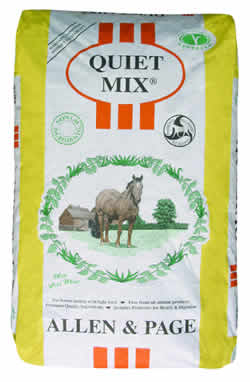Keeping Condition through the Winter
Sophie
Edwards MSc, BSc (Hons), BHSSM-Allen & Page Nutritionist
During the winter your horse will probably have to spend a large
proportion of the day indoors. Turning him out for a few hours each
day is very important - he will be able to get some exercise, relax,
socialise with other horses, and pick at any grass that is available.
Even if there is a good covering of grass it will be of low nutritive
value and additional forage will be essential to help to satisfy
his appetite, avoid boredom, and maintain a healthy digestive system.
Some horses will start to put on weight on unrestricted forage and
it may be necessary to mix the hay ration with oat straw to maintain
the bulk of the fibre, but reduce the calorie intake.
Hay
is the most commonly used forage in this country although it contains
a high degree of dust and spores. Soaking it for 30 minutes will
suppress the spores and it should not be allowed to dry out before
it is fed, or the spores will still be breathed in and can damage
the airways. If soaked for longer than 30 minutes, valuable nutrients
can leach out and be washed away.
Haylage
is a good dust-free alternative form of forage. This is made from
grass that is sealed in airtight bags and then undergoes a mild
fermentation process that prevents fungal spores from growing. You
should feed more haylage than you would hay, which will maintain
his fibre intake, and cut down a little on the concentrate feed,
as haylage is usually more nutritious than hay. Changing to a lower
energy, high fibre concentrate feed, such as Fibre Pencils, may
also be a good idea.
 |
A
horse will expend up to 80% of his feed energy in winter just
to keep warm. Fibre is the most 'warming' food for your horse
as more heat is produced during the digestion of fibre than
any other nutrient. Eating one kilogram of hay will produce
twice the heat from one kilogram of barley, and this heat
has an internal warming effect on the horse. (You should also
ensure that your horse is adequately rugged during winter.)
Unless
your horse is an incredibly 'good doer' then forage alone
will seldom be enough to maintain his condition and give him
enough energy for the work he is doing in winter. He will
need a concentrate feed as a supplement. If he is generally
good at maintaining his condition and does not need a concentrate
during the summer, then good quality forage and a low energy
concentrate, like Quiet Mix will give him sufficient energy
to ensure that he does not lose weight over the winter. This
regime is ideal for horses and ponies that are only in light
work, or are resting, or if you are only able to ride at weekends.
If, however, you feed concentrates all year round, then you
will need to increase the quantity during the winter - unless
he is doing less work. Or switch to either a higher energy
feed, or to a conditioning feed such as Weight Gain Mix or
Calm & Condition. This will allow you to give him more
energy or put on weight, without increasing the total quantity
of feed he receives.
For
more information or advice, contact Allen and Page at: Norfolk
Mill, Shipdham, Thetford, Norfolk, IP25 7SD. Tel: 01362 822900
or fax: 01362 822910. www.allenandpage.com
Email: sales@allenandpage.co.uk
|
.
|







